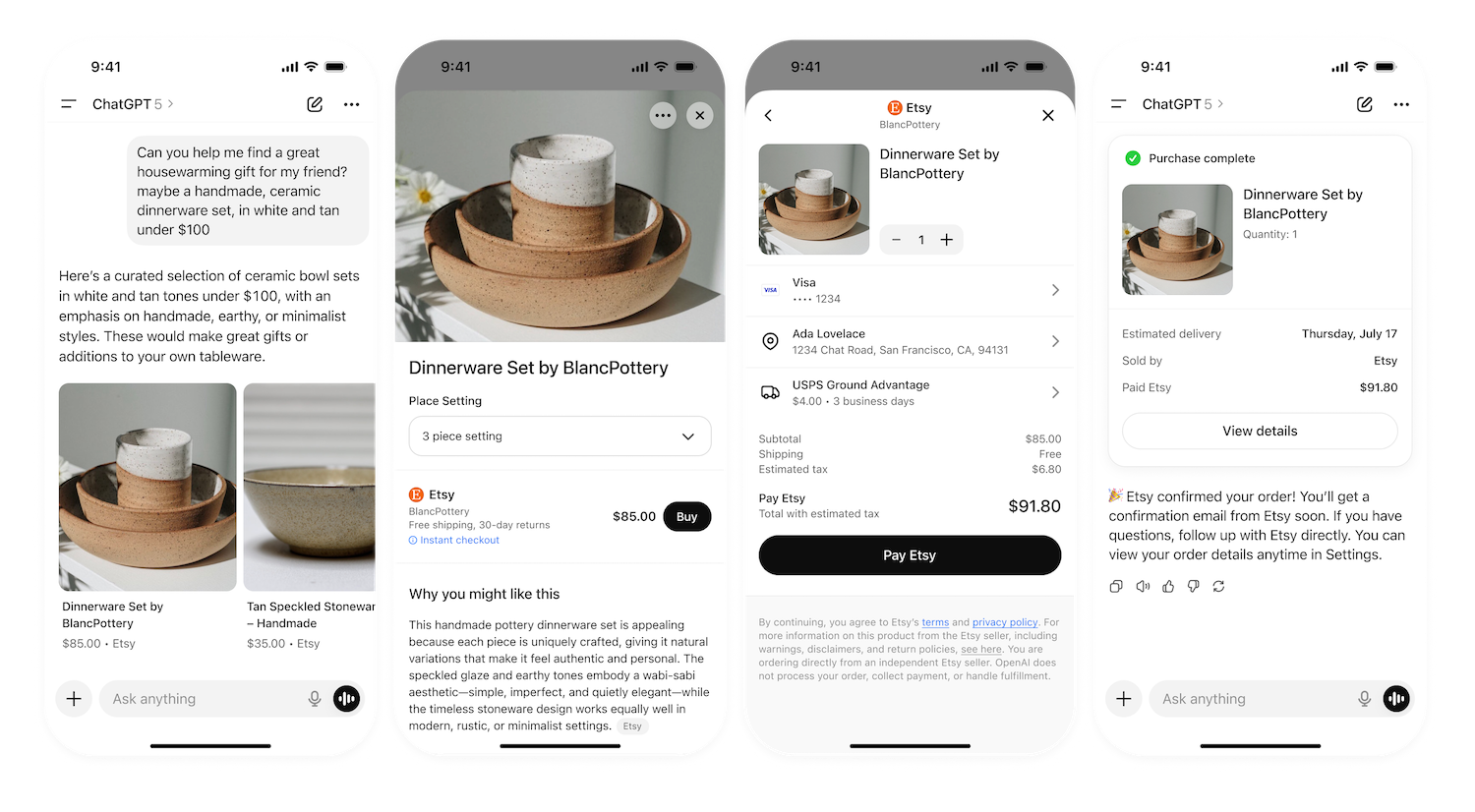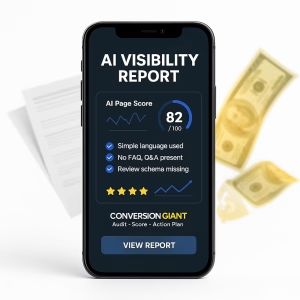OpenAI’s new Agentic Commerce Protocol (ACP) might quietly become the most important change to digital commerce since Google Shopping first launched.
It’s not another marketplace or ad channel. It’s a new standard that allows AI agents—like ChatGPT—to interact directly with merchants to discover products, answer questions, and even complete purchases without ever leaving the conversation.
For anyone selling products online—or managing marketing for those who do—this is a pivotal moment. Your data quality, brand trust, and user experience are about to matter more than your ad budget.
What ACP Actually Is
ACP was developed by OpenAI and Stripe as an open protocol that connects conversational AI agents with merchant systems. It allows agents to:
- Access structured product feeds from participating merchants
- Pull live information such as price, availability, and shipping options
- Initiate checkout using Stripe’s shared payment token system, letting users buy directly in chat
So a user might ask ChatGPT, “Show me a coffee mug that keeps drinks hot but isn’t insulated stainless steel,” and instead of sending them across multiple websites, ChatGPT could display real products, explain the pros and cons of each material, and allow checkout right inside the conversation.
Merchants stay fully in control of the transaction. They remain the seller of record, manage fulfillment, handle taxes and returns, and set policies. The AI simply serves as the connection between user intent and merchant capability.
ACP is already live with select Etsy merchants, and Shopify integration is expected next. That’s the early rollout that will determine how fast this new ecosystem scales.
What Makes ACP Different
Traditional eCommerce relies on listings and search queries. You post products, optimize for keywords, and rely on algorithms to decide whether you show up.
ACP changes that. Discovery now happens through conversation—and that’s a much higher bar for visibility.
Instead of typing “noise-cancelling headphones,” a user might tell ChatGPT, “I work in a busy office and need headphones that block out voices but still sound natural for calls.”
The AI doesn’t match keywords—it interprets purpose, environment, and intent, then decides which products best fit that scenario.
This is a shift from keyword relevance to semantic understanding. If your product data doesn’t clearly communicate attributes, materials, and differentiators, the AI simply won’t recognize you as a match.

Source: OpenAI Developers
What We Know So Far
From OpenAI’s early documentation and rollout:
- Instant Checkout is already available for some Etsy sellers.
- Shopify integration is in active testing.
- Merchants pay a small transaction fee when a purchase occurs, not per impression or click.
- Ranking is not pay-to-play—at least not yet.
- ACP is open-source (Apache 2.0), meaning other AI platforms can adopt it too.
That makes ACP less like a new “ad network” and more like an entirely new layer of commerce—one that any agent could eventually use.
What We Can Infer About How Merchants Will Be Prioritized
OpenAI hasn’t released its ranking formula, but if you read between the lines, you can see where it’s headed.
Product visibility will likely depend on a combination of data quality, reliability, and customer outcomes—not ad spend.
The key drivers will include:
- Relevance – How well your product matches the user’s conversational intent.
- Feed Quality – Completeness, structure, and clarity of your product attributes.
- Merchant Reliability – Order acceptance rates, fulfillment speed, and accuracy.
- Price and Availability – Competitive pricing and real-time stock accuracy.
- Integration Health – Smooth, error-free ACP and checkout performance.
- User Experience Signals – Return rates, satisfaction, and repeat purchases.
If that sounds familiar, it’s because the same fundamentals once powered organic visibility in Google Shopping—only now, the rules are being rewritten for conversational AI.
The Google Shopping Precedent (Briefly)
It’s worth a quick look back.
In the early days of Google Shopping, merchants who treated their product feeds seriously—clean data, consistent pricing, accurate attributes—earned top visibility for free. Those who didn’t vanished from search results.
ACP will likely follow a similar pattern.
If your product data is vague, incomplete, or inconsistent, the AI won’t “see” it as relevant or reliable. But if your data is well-structured, rich with attributes, and backed by a trustworthy record of fulfillment, you’ll show up more often—and get recommended more confidently.
What Merchants Should Focus On Right Now
ACP will reward quality and consistency, not gimmicks. Visibility won’t be something you buy—it’ll be something you earn.
Here’s where to start:
- Feed Quality & Completeness
Fill every field. Go beyond basics. If you sell home goods, list materials, dimensions, and care details.
Example: Instead of “garden tools,” describe “carbon steel trowel with ergonomic ash wood handle and rust-resistant finish.”
That level of clarity helps AI understand when your product fits the conversation—like when someone asks, “What’s a good tool for repotting houseplants without making a mess?” - Reputation & Reliability
Maintain consistent fulfillment and inventory accuracy. The more dependable your operation, the more the system will trust you. - Pricing Transparency
Keep prices fair and stable. The AI is built to protect user trust, and unpredictable pricing may lower visibility. - Customer Experience
Expect post-purchase satisfaction data to influence ranking. Returns, complaints, and shipping issues won’t just affect reviews—they’ll affect your discoverability. - Integration Readiness
When ACP opens up broadly for Shopify and other platforms, be ready to integrate cleanly. Checkout errors, latency, or mismatched data will count against you.
The Advertising Question
Right now, ACP isn’t an ad platform. Merchants pay a transaction fee, but there are no bidding systems, no “sponsored” product slots—yet.
Still, it’s safe to assume that advertising will enter the mix within the next 6–12 months. It will likely take the form of:
- Preferred merchant placements
- Sponsored conversational mentions
- Boosted product visibility inside relevant agent queries
But even when that happens, it won’t override trust. AI-driven commerce depends on credibility; no system built to serve users well can afford to promote merchants that erode it.
So while advertising will play a role, it’ll likely amplify good merchants—not rescue bad ones.
The Bigger Picture
ACP isn’t just another eCommerce integration—it’s the beginning of AI-native commerce.
Where search engines once decided who got seen, now AI systems will decide who gets recommended.
For merchants, that means visibility will depend less on marketing hacks and more on data integrity, operational reliability, and brand trustworthiness.
The merchants who invest now—who clean up their feeds, enrich their data, and maintain solid fulfillment—will own the early wave of agentic commerce visibility.
Just as Google Shopping created its early winners, ACP will too. The difference is that this time, the AI will decide who it trusts—not who can outbid the rest.
AI isn’t here to replace advertisers; it’s here to filter for the best ones. The shift ACP brings will reward the merchants who do things right—and expose the ones who’ve been skating by on spend.
Those who treat this as another channel will fall behind. Those who treat it as the next foundation of product visibility will lead it.


